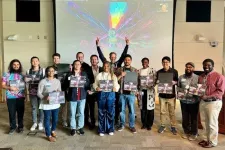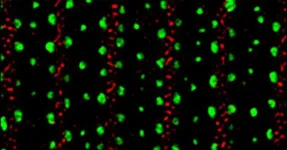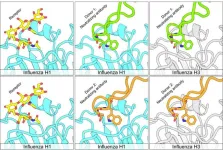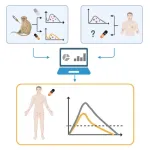(Press-News.org) Doctors diagnosed Christopher Gregg, Ph.D., member of the Nuclear Control of Cell Growth and Differentiation Program at Huntsman Cancer Institute at the University of Utah (the U) and neuroscientist and professor of neurobiology and human genetics at the U, with stage 4 metastatic breast cancer in 2018. At that point, he started thinking of ways to improve his treatment.
“The core problem of metastatic cancer is it evolves,” says Gregg. “There may be a treatment that works today but eventually the disease will become resistant over time.” He sought to solve this with a groundbreaking approach called extinction therapy.
Though breast cancer rates for men are much lower than women, the American Cancer Society (ACS) estimates that in 2023, about 2,800 men in the United States will be diagnosed with breast cancer and 530 men will die from the disease. Many are diagnosed when the disease has progressed to later stages because it is so rare. Most patients who have metastatic cancer receive palliative care, which does not attempt to cure the disease, but instead focuses on providing relief from the symptoms.
Gregg wanted to save lives so he pursued a career in cancer research. He co-lead the winning team at this year’s 11th annual Moffitt Cancer Center Integrated Mathematical Oncology (IMO) workshop. At this annual event, where leading thinkers from around the world develop new innovations in cancer care, Gregg and his team created a tool to help oncologists decide the right treatment path for patients with metastatic cancer.
“On the first day we decided to make a tool that would help oncologists determine the right medication dose and treatment for each individual patient, giving them both the best chance at eliminating the cancer and the best quality of life,” Gregg says. “One of the biggest challenges for cancer treatment is that the drugs are toxic, so not only do we need to factor in the disease response but also how much of the medication their body can handle for a specific amount of time.”
Working around the clock, Gregg’s team used data from his own breast cancer treatment to create a prototype. They created an algorithm that uses artificial intelligence to accurately measure patient symptoms detected from vocal and behavioral information captured via smartphone. This allowed them to precisely measure how a patient is doing during their treatments. Based on their symptoms, the algorithm predicts changes to future symptoms. Oncologists will then be able to adjust treatments to help avoid drug toxicity and dangerous side effects, ultimately designing the best plan for each patient.
With a $50,000 grant from the IMO workshop, Gregg and his team will continue to develop the tool, using it in a clinical trial at the Moffitt Cancer Center starting January 2024.
“When I was diagnosed, I asked my oncologist at Huntsman Cancer Institute, if there were any exciting new treatments that could be curative,” says Gregg. “She said after a long career in oncology, she’s seen many ideas and new medicines that didn’t turn out to be curative. She thought the solution would come from learning how to use the medications we already have in a better way. I started to shift my attention that way.”
Gregg identified ways to help with metastatic cancer. After finding a promising study, he asked the researchers to come to a symposium at Huntsman Cancer Institute. There, they all worked together to come up with Gregg’s first treatment plan, extinction therapy.
Gregg explains that typical care for metastatic patients calls for treatment with medication and if there’s a good response, clinicians give it regularly. However, over time the cancer inevitably evolves and develops resistance to the treatment. Once that happens, doctors introduce a new medication. Extinction therapy introduces new medication before the cancer develops resistance, striking the disease before it progresses. Gregg refers to this as a treatment resistance management plan and believes that these will become standard practice and improve metastatic cancer care.
“My team at the Moffitt Cancer Center competition included 20 diverse experts from around the world. Expert mathematicians, researchers, software developers, and clinicians worked together to create a solution for metastatic cancer care. The amazing thing about this workshop is that it creates an environment that fosters collaboration between those who may not usually work together,” Gregg says.
Since Gregg’s diagnosis in 2018, he and his oncologist have been able to effectively manage treatment resistance in his care. Gregg and his care team continue to work on preventing the development of resistance.
“I’m doing really well right now. I’ve continued to innovate and come up with ideas to control the disease,” Gregg says. “I’ve been off treatment for many months at a time and successfully been able to keep the disease stable. My goal is turning metastatic cancer, which is currently a lethal disease, into a manageable chronic disease that offers patients a high quality of life for a long time.”
This research was supported by the National Institutes of Health and National Cancer Institute including P30 CA042014, U54 CA274507, the Moffitt Center of Excellence for Evolutionary Therapy, Storyline Health Inc., and Huntsman Cancer Foundation.
###
About Huntsman Cancer Institute at the University of Utah
Huntsman Cancer Institute at the University of Utah (the U) is the National Cancer Institute-designated Comprehensive Cancer Center for Utah, Idaho, Montana, Nevada, and Wyoming. With a legacy of innovative cancer research, groundbreaking discoveries, and world-class patient care, we are transforming the way cancer is understood, prevented, diagnosed, treated, and survived. Huntsman Cancer Institute focuses on delivering a cancer-free frontier to all communities in the area we serve. We have more than 300 open clinical trials and 250 research teams studying cancer at any given time. More genes for inherited cancers have been discovered at Huntsman Cancer Institute than at any other cancer center. Our scientists are world-renowned for understanding how cancer begins and using that knowledge to develop innovative approaches to treat each patient’s unique disease. Huntsman Cancer Institute was founded by Jon M. and Karen Huntsman.
END
Male breast cancer diagnosis fuels groundbreaking treatment tool
2023-12-21
ELSE PRESS RELEASES FROM THIS DATE:
NASA’s Hubble watches ‘spoke season’ on Saturn
2023-12-21
This photo of Saturn was taken by NASA's Hubble Space Telescope on October 22, 2023, when the ringed planet was approximately 850 million miles from Earth. Hubble's ultra-sharp vision reveals a phenomenon called ring spokes.
Saturn's spokes are transient features that rotate along with the rings. Their ghostly appearance only persists for two or three rotations around Saturn. During active periods, freshly-formed spokes continuously add to the pattern.
In 1981, NASA's Voyager 2 first photographed the ring spokes. NASA's Cassini orbiter also saw the spokes during its 13-year-long mission that ended in 2017.
Hubble continues ...
Astronomers detect seismic ripples in ancient galactic disk
2023-12-21
A new snapshot of an ancient, far-off galaxy could help scientists understand how it formed and the origins of our own Milky Way.
At more than 12 billion years old, BRI 1335-0417 is the oldest and furthest known spiral galaxy in our universe.
Lead author Dr Takafumi Tsukui said a state-of-the-art telescope called ALMA allowed them to look at this ancient galaxy in much greater detail.
“Specifically, we were interested in how gas was moving into and throughout the galaxy,” Dr Tsukui said.
“Gas is a key ingredient for forming stars and can give ...
Exercise prescription: Pioneering the "third pole" for clinical health management
2023-12-21
Professor Chen Shiyi's team at Huashan Hospital of Fudan University commented on the concept, policy, development and prospect of exercise prescription in the context of " Health for All", which was published in Research (10.34133/research.0284) under the title of " Exercise Prescription: Pioneering the “Third Pole” for Clinical Health Management".
Modern lifestyles have led to reduced physical activity and a rise in chronic diseases from a young age. Exercise ...
Inside the matrix: Nanoscale patterns revealed within model research organism
2023-12-21
Species throughout the animal kingdom feature vital interfaces between the outermost layers of their bodies and the environment. Intricate microscopic structures—featured on the outer skin layers of humans, as one example—are known to assemble in matrix patterns.
But how these complex structures, known as apical extracellular matrices (aECMs) are assembled into elaborately woven architectures has remained an elusive question.
Now, following years of research and the power of a technologically advanced instrument, University of California San Diego scientists have unraveled the underpinnings ...
Urology treatment studies show increased reporting of harmful effects
2023-12-21
Waltham — December 11, 2023 —
In recent years, clinical trial reports in major urology journals have been more likely to include data on harmful effects of treatments, reports a study in the January issue of The Journal of Urology®, an Official Journal of the American Urological Association (AUA). The journal is published in the Lippincott portfolio by Wolters Kluwer.
"Our analysis finds a marked increase in reporting of potential harms in randomized treatment trials ...
New type of antibody shows promise against multiple forms of flu virus
2023-12-21
Researchers have identified a previously unrecognized class of antibodies—immune system proteins that protect against disease—that appear capable of neutralizing multiple forms of flu virus. These findings, which could contribute to development of more broadly protective flu vaccines, will publish December 21st by Holly Simmons of the University of Pittsburgh School of Medicine, US, and colleagues in the open access journal PLOS Biology.
A flu vaccine prompts the immune system to make antibodies that can bind to a viral protein ...
Despite use of tecovirimat since the beginning of the 2022 mpox outbreak, few data have been published on its antiviral effect in humans
2023-12-21
Despite use of tecovirimat since the beginning of the 2022 mpox outbreak, few data have been published on its antiviral effect in humans; this study predicts the impact of early tecovirimat administration on the time to viral clearance in patients with mpox infection, using an integrative modeling approach combining pre-clinical and clinical data
#####
In your coverage, please use this URL to provide access to the freely available paper in PLOS Biology: http://journals.plos.org/plosbiology/article?id=10.1371/journal.pbio.3002249
Article Title: Early administration of tecovirimat shortens the time to mpox clearance ...
How technology and economics can help save endangered species
2023-12-21
COLUMBUS, Ohio – A lot has changed in the world since the Endangered Species Act (ESA) was enacted 50 years ago in December 1973.
Two researchers at The Ohio State University were among a group of experts invited by the journal Science to discuss how the ESA has evolved and what its future might hold.
Tanya Berger-Wolf, faculty director of Ohio State’s Translational Data Analytics Institute, led a group that wrote on “Sustainable, trustworthy, human-technology partnership.” Amy Ando, professor and chair of the university’s Department of Agricultural, Environmental, and Development Economics, ...
Sniffing women’s tears reduces aggressive behavior in men
2023-12-21
New research, publishing December 21st in the open access journal in PLOS Biology, shows that tears from women contain chemicals that block aggression in men. The study led by Shani Agron at the Weizmann Institute of Science, Israel, finds that sniffing tears leads to reduced brain activity related to aggression, which results is less aggressive behavior.
Male aggression in rodents is known to be blocked when they smell female tears. This is an example of social chemosignaling, a process that is common in animals but less common—or less understood—in humans. To determine whether tears have the same affect in people, ...
Polar bear fur-inspired fibers offer exceptional thermal insulation, tested in a sweater
2023-12-21
Inspired by the structure of polar bear fur, researchers present a knittable aerogel fiber with exceptional thermal and mechanical properties. The fibers are washable, dyeable, durable, and well-suited to be used in advanced textiles. This allowed the researchers to test them in a sweater that demonstrated impressive thermal insulation, among other features. Aerogels are an ideal material for thermal insulation. They demonstrate high porosity and extremely low thermal conductivity. However, the application of ...







